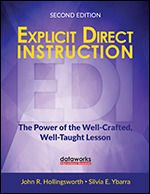Explicit Direct Instruction (EDI)
The Power of the Well-Crafted, Well-Taught Lesson
- John R. Hollingsworth - DataWORKS Educational Research
- Silvia E. Ybarra - DataWORKS Educational Research
Corwin Teaching Essentials
Explicit Direct Instruction (EDI), an approach based on the premise that all children can learn, helps teachers deliver well-designed, well-taught lessons that significantly improve achievement for all learners. Authors Hollingsworth and Ybarra have refined and extended their highly successful methods in this second edition of their bestselling book.
Written in an easy-to-read, entertaining style, this resource provides K-12 teachers with concrete strategies, detailed sample lessons, and scenarios that illustrate what EDI techniques look like in inclusive and diverse classrooms. With chapters covering the individual components of EDI, such as checking for understanding and activating prior knowledge, this updated edition refines the methods so that they are even more effective and easier to implement. Readers will find:
• Strategies for continuous, systematized student engagement
• Expanded corrective feedback strategies
• Clear alignment to the latest content standards
• A new, field-tested strategy for skill development and guided practice
• Expanded information about differentiation and scaffolding
Combining educational theory, brain research, and data analysis, this is a fine-tuned, step-by-step guide to a highly effective teaching method.
"Before EDI, our school was a ship adrift at sea with everyone rowing in different directions. EDI has provided us with a framework for instruction and a common language that allowed us to all row in the same direction.
Benjamin Luis, Principal
Liberty Middle School, Lemoore, CA
“EDI makes students accountable. They see now that school is a place to work and learn and play, and they love it. Because even though it is hard, they are doing well.”
Trudy Cox, School Instructional Coach
St. Mary Star of the Sea Catholic School, Carnarvon, Western Australia
“One of our specialties is research on instruction and training. In both K-12 education and in higher education, we find that the features of the DataWORKS program fit all of the research that we think is the best evidence right now. You owe it to yourself and to your students to at least give it a try.”
"I would like all teachers in our district to be exposed to DataWORKS. Only then will there be systemic change for our students."
“Students in an EDI classroom share the teaching responsibilities. They eagerly participate during Pair-Share and remind the teacher if s/he has forgotten "their time." It is a very non-threatening environment and students are prepared for success.”
“EDI totally transformed my teaching of both children and adults. It is research-based, easy to use, and rewarding for both the teacher and the students. Most importantly, it works!"
“EDI is a difference maker for all students. High achievers are given the opportunity to explore the curriculum in depth and at the highest level. Challenged students are provided scaffolds and support so they can access what is being taught.”
“EDI and the DataWORKS model of school improvement made a dramatic impact on classroom instruction in the schools of South Carolina. The delivery of instruction using this program provided clarity and a focus in addressing state standards and the learning environment in classrooms.”
“What is the best way to teach students? The answer is Explicit Direct Instruction. I am a retired principal, director, and adjunct professor in California. I have been using the model of EDI published by DataWORKS for the past 10 years. I have taught it to teachers and future administrators. I have also used it in teaching my own adult students.”

